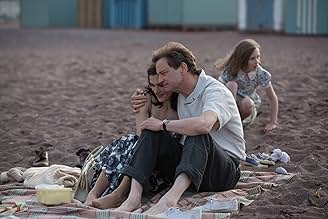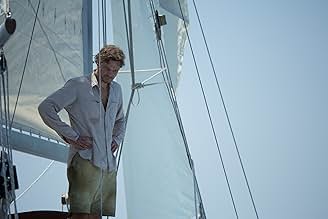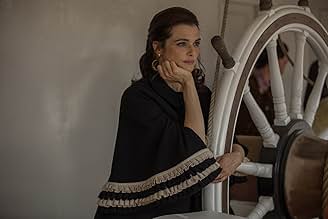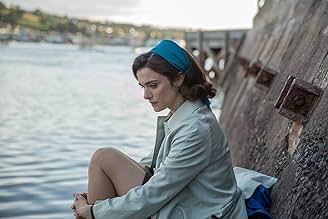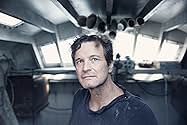IMDb-BEWERTUNG
6,0/10
10.114
IHRE BEWERTUNG
Der katastrophale Versuch des Seglers Donald Crowhurst, im Jahr 1968 das Golden Globe Race zu gewinnen, endet mit der Fabrizierung eines ungeheuerlichen Berichts darüber, wie er allein die W... Alles lesenDer katastrophale Versuch des Seglers Donald Crowhurst, im Jahr 1968 das Golden Globe Race zu gewinnen, endet mit der Fabrizierung eines ungeheuerlichen Berichts darüber, wie er allein die Welt umsegelt hat.Der katastrophale Versuch des Seglers Donald Crowhurst, im Jahr 1968 das Golden Globe Race zu gewinnen, endet mit der Fabrizierung eines ungeheuerlichen Berichts darüber, wie er allein die Welt umsegelt hat.
- Auszeichnungen
- 1 wins total
Richard Braine
- Chamber Member
- (as Richard Blaine)
Empfohlene Bewertungen
I suppose any popular 101 minute treament of this story is going to struggle to explore the themes of male expectation, failure and isolation that are relevant to the Crowhurst story, and certainly for a film about being alone at sea for 7 months, we spend a lot time seeing pretty images of Teignmonth.
The script and pacing are rather generic in its box-ticking of events, the usual cliched news report voice overs and discussions in pubs chugging along the events in a necessary manner, while divorcing us from whatever Crowhurst experienced on his own, hearing of the travails of his competitors and how they variously piled new pressure upon his unfolding catastrophe. The second half of the film would have benefitted without showing any other characters at all. Of course his family were suffering from their hopes, of course his publicist and financier were taking advantage of him, but there was no of course about how Crowhurst's decent into madness led him to writing about 'cosmic beings'. The most intriguing part of the story remains untold, and it could only be examined through more isolation, more of the sea.
Beyond that, Colin Firth is miscast. Crowhurst was an eccentric, he was dashing and goofy at the same time, vigorously intelligent and utterly misguided, and Firth makes the whole terrible misadeventure look like the misspent Sunday afternoon of a Daily Telegraph reader. I suppose Firth was required for funding? Hardly his fault thoigh, but this role needed Hugh Bonneville, Martin Freeman, or a more left-field actor.
The script and pacing are rather generic in its box-ticking of events, the usual cliched news report voice overs and discussions in pubs chugging along the events in a necessary manner, while divorcing us from whatever Crowhurst experienced on his own, hearing of the travails of his competitors and how they variously piled new pressure upon his unfolding catastrophe. The second half of the film would have benefitted without showing any other characters at all. Of course his family were suffering from their hopes, of course his publicist and financier were taking advantage of him, but there was no of course about how Crowhurst's decent into madness led him to writing about 'cosmic beings'. The most intriguing part of the story remains untold, and it could only be examined through more isolation, more of the sea.
Beyond that, Colin Firth is miscast. Crowhurst was an eccentric, he was dashing and goofy at the same time, vigorously intelligent and utterly misguided, and Firth makes the whole terrible misadeventure look like the misspent Sunday afternoon of a Daily Telegraph reader. I suppose Firth was required for funding? Hardly his fault thoigh, but this role needed Hugh Bonneville, Martin Freeman, or a more left-field actor.
As many have mentioned before, the documentary "Deep Water" is better at telling the story than this film, but "The Mercy" still has its merits. The movie looks great for the most part in its 1960's setting, and the actors all do their jobs. I particularly liked David Thewlis and Rachel Weisz in their roles. Colin Firth is also good, but looks like a sad dog for much of the movie, even before his character gets into trouble in the beginning and eventually sets sail.
The movie almost rushes through the intro, with rapid speaking lines and stressed scenes that don't feel all that natural. This is actually a problem all the way through, as it never slows down enough for us to truly take in the isolation and loneliness that Donald Crowhurst (Colin Firth, that is) must have felt in real life. We spend too much time on land and too little time at sea. As with many other films, it's hard to translate human thoughts onto the big screen ("The Old Man and the Sea" must be the classic example of this), and "The Mercy" fails on this note more often than it succeeds.
I do, however, still recommend the film, because it is still a good movie with good actors, and it's worth watching. It's just a shame that it doesn't reach its full potential, with a fascinating story such as this one.
I haven't seen "Crowhurst" (produced at the same time as "The Mercy", but by a different studio), but I've heard that that one is a bit better. In the end, "Deep Water" seems to be the best choice, however.
UPDATE (8 November, 2018): I have now seen "Crowhurst", and I am not sure if it's better than "The Mercy". I gave both films six stars. They are very different, however, as "Crowhurst" is more of a low-budget, theatrical art house film. It is also a character study, rather than a story-driven movie. Because of this, I think both films are worth watching, for their own reasons. "Deep Water" tells the story better than either of them, however and is indeed the best choice to watch.
The movie almost rushes through the intro, with rapid speaking lines and stressed scenes that don't feel all that natural. This is actually a problem all the way through, as it never slows down enough for us to truly take in the isolation and loneliness that Donald Crowhurst (Colin Firth, that is) must have felt in real life. We spend too much time on land and too little time at sea. As with many other films, it's hard to translate human thoughts onto the big screen ("The Old Man and the Sea" must be the classic example of this), and "The Mercy" fails on this note more often than it succeeds.
I do, however, still recommend the film, because it is still a good movie with good actors, and it's worth watching. It's just a shame that it doesn't reach its full potential, with a fascinating story such as this one.
I haven't seen "Crowhurst" (produced at the same time as "The Mercy", but by a different studio), but I've heard that that one is a bit better. In the end, "Deep Water" seems to be the best choice, however.
UPDATE (8 November, 2018): I have now seen "Crowhurst", and I am not sure if it's better than "The Mercy". I gave both films six stars. They are very different, however, as "Crowhurst" is more of a low-budget, theatrical art house film. It is also a character study, rather than a story-driven movie. Because of this, I think both films are worth watching, for their own reasons. "Deep Water" tells the story better than either of them, however and is indeed the best choice to watch.
Though it is highly speculative and certain implications it heavily makes may be either irresponsible or insensitive because of this, 'The Mercy (2018)' has the advantage of an interesting mystery that affords a certain dramatic license simply because of the perspective it portrays. It represents a rather captivating and ultimately quite tragic tale of man vs wild and, perhaps more acutely, man vs both our inner demons as well as those of the ones we leave by the shore. I didn't know the real-life story and I'm glad I didn't, because it certainly goes in ways I didn't expect. The pacey first act is fast, fluid and fantastically well-told, even if its montage style is sometimes slightly tiring, but the picture always knows when to drop its anchor so that the slower moments can hammer home the rather blind-siding sad soul at the heart of this surprisingly moving flick. 7/10
In the 60's a guy decides one day that he should risk all he has to race around the world in a yacht.
This is his story.
The first half of the movie concerns itself with the technical, financial and emotional aspects of the trip.
There are some obvious hurdles to this proposed jaunt around the globe.
The main character lacks money, experience, time and the most rudimentary knowledge of sailing in the high seas.
Because of the stiff-upper-lipness of the period everyone is very optimistic and polite about what appears, at first hand, his obvious suicide mission.
The back end of the film is about the race.
Watching someone bob around on the sea in a tiny boat it turns out is very, very dull.
This cast do a grand job bringing the reserved characters to life; Rachel Weisz easily steals the show .
The film is non-judgmental, non-sensational and well crafted.
It is nice to watch something that hangs around in second gear; but saying that it does (ironically) make for quite a dry watch.
This is a perfect film for a Sunday when you feel like something serious but not too taxing.
This is his story.
The first half of the movie concerns itself with the technical, financial and emotional aspects of the trip.
There are some obvious hurdles to this proposed jaunt around the globe.
The main character lacks money, experience, time and the most rudimentary knowledge of sailing in the high seas.
Because of the stiff-upper-lipness of the period everyone is very optimistic and polite about what appears, at first hand, his obvious suicide mission.
The back end of the film is about the race.
Watching someone bob around on the sea in a tiny boat it turns out is very, very dull.
This cast do a grand job bringing the reserved characters to life; Rachel Weisz easily steals the show .
The film is non-judgmental, non-sensational and well crafted.
It is nice to watch something that hangs around in second gear; but saying that it does (ironically) make for quite a dry watch.
This is a perfect film for a Sunday when you feel like something serious but not too taxing.
It's 1968. Donald Crowhurst (Colin Firth, "Kingsman: The Golden Circle"; "Magic in the Moonlight"), an amateur sailor and entrepreneur based in Teignmouth, Devon, is inspired by listening to single-handed round-the-world yachtsman Sir Francis Chichester and does a a crazy thing. He puts his business, his family's house and his own life on the line by entering the Sunday Times single-handed round-the-world yacht race. It's not even as if he has a boat built yet!
Lending him the money, under onerous terms, are local businessman Mr Best (Ken Stott, "The Hobbit") and local newspaper editor Rodney Hallworth (David Thewlis, "Wonder Woman", "The Theory of Everything"). With the race deadline upon him, Crowhurst is pressed into sailing away from his beloved wife Clare (Rachel Weisz, "Denial", "The Lobster") and young family in a trimaran that is well below par.
But what happens next is so ludicrous that it makes a mockery of whoever wrote this ridiculous work of fiction. Ah... but wait a minute... it's a true story!
It is in fact such an astonishing story that this is a film that is easy to spoil in a review, a fact that seems to have passed many UK newspaper reviewers by (aarrrggghhh!!). So I will leave much comment to a "spoiler section" on http://bob-the-movie-man.com. The trailer is also best avoided: this is honestly a film worth seeing cold.
What can I say that is spoiler-free then?
Firth and Weisz make a well-matched couple, and the rest of the cast is peppered with well-known faces from British film and (particularly) TV: Andrew Buchan and Jonathan Bailey (from "Broadchurch"); Mark Gatiss ("Sherlock", "Out Kind of Traitor"); Adrian Schiller ("Victoria"; "Beauty and the Beast").
The first part of the film is well executed and excellent value for older viewers. 60's Devon is warm, bucolic and nostalgic. In fact, the film beautifully creates the late 60's of my childhood, from the boxy hardwood furniture of the Crowhurst's house to the Meccano set opened at Christmas time.
Once afloat though, the film is less successful at getting its sea-legs. The story is riveting, but quite a number of the scenes raise more questions than they answer. As stress takes hold it is perhaps not surprising that there are a few fantastical flights of movie fancy. But some specific elements in Scott Burns' script don't quite gel: a brass clock overboard is a case in point. What? Why?
And it seems to be light on the fallout from the race: there is a weighty scene in the trailer between Best and Hallworth that (unless I dozed off!) I don't think appeared in the final cut, and I think was needed.
All in all, I was left feeling mildly dissatisfied: a potentially good film by "Theory of Everything" director James Marsh that rather goes off the rails in the final stretch.
This was a time where morality and honour were often rigidly adhered to - British "stiff upper lip" and all that - and seemed to carry a lot more weight than they do today. So some of the decisions in the film might mystify younger viewers. But for the packed older audience in my showing then it was a gripping, stressful, but far from flawless watch.
I'd also like to take this opportunity to pay my respects to the film's composer Jóhann Jóhannsson, who shockingly died last week at the ridiculously young age of 48. His strange and atmospheric music for films including "The Theory of Everything", "Sicario" and (particularly) "Arrival" set him on the path to be a film composing great of the future. Like James Horner, another awful and untimely loss to the film music industry.
(For the full graphical review - and a spoiler section for those who have seen the film - please visit bob-the-movie-man.com. Thanks).
Lending him the money, under onerous terms, are local businessman Mr Best (Ken Stott, "The Hobbit") and local newspaper editor Rodney Hallworth (David Thewlis, "Wonder Woman", "The Theory of Everything"). With the race deadline upon him, Crowhurst is pressed into sailing away from his beloved wife Clare (Rachel Weisz, "Denial", "The Lobster") and young family in a trimaran that is well below par.
But what happens next is so ludicrous that it makes a mockery of whoever wrote this ridiculous work of fiction. Ah... but wait a minute... it's a true story!
It is in fact such an astonishing story that this is a film that is easy to spoil in a review, a fact that seems to have passed many UK newspaper reviewers by (aarrrggghhh!!). So I will leave much comment to a "spoiler section" on http://bob-the-movie-man.com. The trailer is also best avoided: this is honestly a film worth seeing cold.
What can I say that is spoiler-free then?
Firth and Weisz make a well-matched couple, and the rest of the cast is peppered with well-known faces from British film and (particularly) TV: Andrew Buchan and Jonathan Bailey (from "Broadchurch"); Mark Gatiss ("Sherlock", "Out Kind of Traitor"); Adrian Schiller ("Victoria"; "Beauty and the Beast").
The first part of the film is well executed and excellent value for older viewers. 60's Devon is warm, bucolic and nostalgic. In fact, the film beautifully creates the late 60's of my childhood, from the boxy hardwood furniture of the Crowhurst's house to the Meccano set opened at Christmas time.
Once afloat though, the film is less successful at getting its sea-legs. The story is riveting, but quite a number of the scenes raise more questions than they answer. As stress takes hold it is perhaps not surprising that there are a few fantastical flights of movie fancy. But some specific elements in Scott Burns' script don't quite gel: a brass clock overboard is a case in point. What? Why?
And it seems to be light on the fallout from the race: there is a weighty scene in the trailer between Best and Hallworth that (unless I dozed off!) I don't think appeared in the final cut, and I think was needed.
All in all, I was left feeling mildly dissatisfied: a potentially good film by "Theory of Everything" director James Marsh that rather goes off the rails in the final stretch.
This was a time where morality and honour were often rigidly adhered to - British "stiff upper lip" and all that - and seemed to carry a lot more weight than they do today. So some of the decisions in the film might mystify younger viewers. But for the packed older audience in my showing then it was a gripping, stressful, but far from flawless watch.
I'd also like to take this opportunity to pay my respects to the film's composer Jóhann Jóhannsson, who shockingly died last week at the ridiculously young age of 48. His strange and atmospheric music for films including "The Theory of Everything", "Sicario" and (particularly) "Arrival" set him on the path to be a film composing great of the future. Like James Horner, another awful and untimely loss to the film music industry.
(For the full graphical review - and a spoiler section for those who have seen the film - please visit bob-the-movie-man.com. Thanks).
Wusstest du schon
- WissenswertesAt age 55, Colin Firth was 20 years older than Donald Crowhurst was when he set off on the Golden Globe race.
- PatzerWhen the Teignmouth Electron is leaving harbour, the yachts in the background have a stern shape that's about 40 years too modern.
- Zitate
Sir Francis Chichester: A man alone on a boat is more alone than any man alive.
- VerbindungenFeatured in Projector: The Mercy (2018)
- SoundtracksMaria Elena
Written by Lorenzo Barcelata
Performed by Los Indios Tabajaras
Top-Auswahl
Melde dich zum Bewerten an und greife auf die Watchlist für personalisierte Empfehlungen zu.
- How long is The Mercy?Powered by Alexa
Details
Box Office
- Budget
- 18.000.000 $ (geschätzt)
- Bruttoertrag in den USA und Kanada
- 29.538 $
- Weltweiter Bruttoertrag
- 4.536.348 $
- Laufzeit1 Stunde 52 Minuten
- Farbe
- Sound-Mix
- Seitenverhältnis
- 2.35 : 1
Zu dieser Seite beitragen
Bearbeitung vorschlagen oder fehlenden Inhalt hinzufügen



